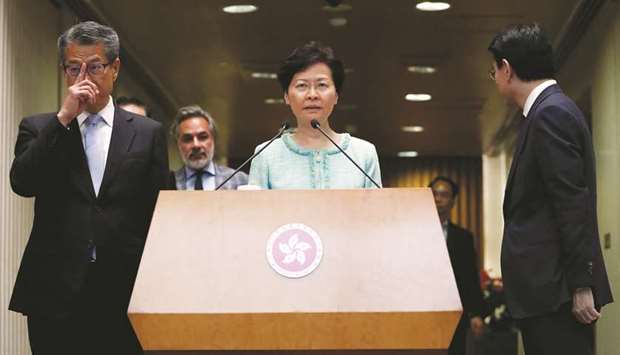Hong Kong’s protests could hit the economy like a tsunami, the city’s leader said yesterday, pledging daring economic reforms in response, even as activists geared up for marches through the sweltering weekend.
Flanked by business leaders, embattled chief executive Carrie Lam, told reporters that businesses in the Asian financial hub were “very worried” about the economic fallout, after meeting 33 business representatives and senior officials. “We have had two months of political dispute,” she said. “This is not a cyclical downturn.
Moreover, this downturn is coming very quickly.
Some people have described it as coming like a tsunami...the economic recovery will take a long time.”
What started as an angry response to a now-suspended measure for criminal suspects to be extradited for trial in mainland Chinese courts has grown to plunge the city into its biggest crisis since its 1997 return to Chinese rule from Britain. More nebulous demands now include calls for greater democracy, Lam’s resignation, and even keeping out mainland tourists.
The increasingly violent protests also pose one of the gravest populist challenges yet to Chinese leader Xi Jinping, coming with the city caught in the crossfire of an escalating trade war between China and the United States.
Dozens of companies have warned of faltering earnings, amid daily warnings this week from city officials that the protests were hurting residents’ livelihoods and that Hong Kong could be headed for recession.
Lam said the city’s Executive Council would next week resume meetings suspended in mid-June to prepare a policy response that would consider “daring measures”.
“For Hong Kong’s society to recover the foundation is the same (as that of the economy),” she said. “We must stop the widespread violence.”
She urged landlords to ease rents on hard-pressed retailers, but said she would give no ground on demands for an inquiry into police behaviour at demonstrations.
“I disagree with (establishing) an independent inquiry that targets police work,” she said. “I don’t think we should just sort of make concessions in order to silence the violent protesters.”
Another warning came from China’s aviation regulator, which issued a safety alert to Cathay Pacific Airways demanding that the carrier suspend personnel involved in protests.
‘Broken city’
Young people have been at the forefront of the protests, worried about China encroaching on Hong Kong’s freedoms but also concerned with issues such as sky-high living costs and what many see as an unfair housing policy favouring the wealthy.
Soaring property prices have pushed up rents and had a knock-on effect on prices of goods and services.
Last year, Oxfam said the city’s income inequality was at its highest in more than four decades.
Hong Kong’s powerful property developers spoke out for the first time yesterday, urging calm in a statement signed by 17 companies, including CK Asset Holdings Ltd, founded by property tycoon Li Ka-shing, the city’s richest man. Young people formed the bulk of a crowd of about 1,000 activists who occupied the airport arrivals hall, handing out anti-government leaflets and waving banners in a dozen languages in a bid to raise awareness among visitors.
“Dear travellers,” read one leaflet in English. “Please forgive us for the ‘unexpected’ Hong Kong...you’ve arrived in a broken, torn-apart city, not the one you have once pictured. Yet for this Hong Kong, we fight.”
Protesters sang “Do You Hear the People Sing?” from the musical “Les Miserables” and chanted: “Democracy now” and “Hong Kongers, add oil!” – a popular exhortation in Cantonese.
There was no visible police presence.
“It will be a peaceful protest as long as the police do not show up,” one protester, Charlotte Lam, 16, told Reuters.
“We have made stickers, banners in over 16 languages, ranging from Japanese to Spanish.
We want to spread our message internationally.
We are not rioters, we are a group of Hong Kong people fighting for human rights and freedom.”

Hong Kong chief executive Carrie Lam attends a news conference. u201cWe have had two months of political dispute. This is not a cyclical downturn. Moreover, this downturn is coming very quickly. Some people have described it as coming like a tsunami...the economic recovery will take a long time,u201d she said.
